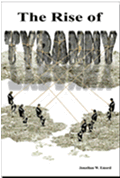THE INEVITABLE
By
Attorney Jonathan Emord
Author of "The
Rise of Tyranny" and
"Global
Censorship of Health Information"
January 9, 2012
NewsWithViews.com
As the nation continues to spend like a drunken sailor, pushing the national debt in excess of $14 trillion and our present unpaid commitments to entitlements to over $62 trillion, we accelerate toward the day (within the next five to ten years) when just paying interest on the debt we are amassing will exceed $700 billion and just paying entitlements annually will exceed $2 trillion. After interest on the debt and entitlements, there will be precious little left for discretionary spending. In short, as economists from Clinton OMB Chief Alice Rivlin to Bush Comptroller General David Walker have told us, the spending spree is unsustainable. That means either uncontrolled spending will bring down the entire economy and with it the government, or the threat of collapse will yield a political change that results in massive spending cuts. Either way, the federal government is about to become much smaller.
With rare exceptions like Paul Ryan, Ron Paul, and Rand Paul, few in Congress accept that big government’s days are numbered and that to avert a catastrophe dramatic reductions in spending must occur right now. Senate Majority Leader Harry Reid prefers a dream world where government growth never ends. He speaks of continuing Social Security and Medicare “as we know” them, blithely ignoring the economic reality that entitlement spending is unsustainable, in the apparent hope that the crisis coming to those programs will arrive after he retires from the Senate. Most others continue to play the Washington spending game also, doing nothing to reign in the bureaucracy and still finding ways to devote tax dollars for pet projects (while at the same time mouthing platitudes about fiscal responsibility).
The President and the Senate, in particular, act like members of the Court of Louis the XVI in 1791 on the eve of the French Revolution. The party goes on with occasional fits of reality setting in, but nothing so much as is capable of altering a course to which they have become addicted from years of profligacy. So long as they can get away with spending lavishly, they will. As soon as the party is forced to end, however, and before the public in anger rises up against them, they will have vanished from Washington, clinging to their fat retirement pensions and to new scams to plunder private sector sources of wealth.
Government growth occurs even if spending levels are held at present rates. The bureaucracy finds ways to expand even with reductions in funding. Entitlements grow automatically as ever more boomers enter the Medicare and Social Security roles. Federal spending is like a fissure through a gaping hole in a dam, but while money still flows a day will soon come when it will all dry up.
The basic, simple reality is that government is a parasite. Early in his administration, President Thomas Jefferson recognized that fact. He wrote to Thomas Cooper on November 29, 1802, “I think we have more machinery of government than is necessary, too many parasites living on the labor of the industrious.” He wrote those words when the federal government was equal to less than a fraction of a percent of the gross domestic product. Present federal spending exceeds the GDP.
Because government is a parasite, its survival depends on the health of its host. If its host, the economy, withers and dies, so too does the government. If its host prospers, government does likewise with one major exception. If government so grows in size, scope, and burden that it becomes the underlying cause of the death of its economy host, then even an economy on the rebound will not be enough to prevent ultimate collapse of both. That is where we are today: the federal government is a leviathan. It overtaxes, regulates every aspect of enterprise, and finds by the week new ways to increase its dominion and control over the market. Government growth is so out of control, so profligate, that even an economy on the rebound will not produce enough revenue to prevent the ultimate collapse of the economy and the government.
The sobering reality, to which all will eventually come, is that the federal government is unaffordable and must downsize and downsize dramatically or the game is up. It is not enough to cut a few hundred billion a year when the annual deficit exceeds a trillion. It is not possible to tax the rich and not increase unemployment, thereby forcing even more welfare dollars from federal coffers. There is only one direction that is sustainable, that permits survival. That course involves a dramatic reduction in the size and scope of the federal government.
The present politics of cutting spending involve risks most politicians are still unwilling to take. They are cowards, reprehensible individuals who value themselves more than their country. They fear alienating constituents dependent on the dole. In a very short time, however, our combined national debt and poor economy will create a new political dynamic. A burgeoning body of the public will form a new powerful response to the old politics of tax and spend. Laboring under the crush of a floundering economy, a heavy corporate tax burden, and stultifying regulation, small business leaders and the middle class will unite in ever greater numbers and will make inaction a political liability. At that point, politicians will begin turning. Those of a leftward leaning perspective will call for deep cuts in the defense budget, increases in taxes on the most productive elements of society, and elimination of entitlements for those with the financial wherewithal. Those of a rightward leaning perspective will call for reform of entitlements, privatizing much of it, decreases in taxes that prevent economic growth, and dramatic reduction in the regulatory state.
In time, it will become apparent to all that any increases in taxes will be economically disastrous to the fragile, overburdened economy. That will leave but one direction—cutting government. If politicians cut enough, they, the economy, and the government will survive. If they do not, they, the economy, and the government will come crashing down. It will then be a day like that following the Philadelphia Convention of 1787. We will return to our roots and see that there once was a great American limited federal republic and that it existed without molesting the economy, reaping the rewards of freedom and progress.
The central question is not whether dramatic downsizing is coming but when and how it will be achieved. Just a few decades ago, the Peoples Republic of China came to the startling realization that planned economies are bankrupt economies and that the parasite of government is powerless if the economy is bankrupt. In a dramatic change of direction, China embraced a free market and has, ever since, grown to become a leading economic powerhouse in the world, threatening United States global economic and geopolitical dominance. As we fold in upon ourselves, China is building the largest military in the world and has global ambitions to replace the West, which ambitions are achievable if our nation continues in the direction of self-destruction.
| Subscribe to the NewsWithViews Daily News Alerts! |
If we fail to eliminate from the national political agenda the planned economy President Obama loves so dearly, we will experience (to an ever greater extent) poverty aplenty and an ever downward declination into the abyss of destitution and mediocrity. We have less than a decade to save the nation. If we downsize to balance the budget and reduce the national debt through elimination of those government departments and programs that inhibit free enterprise, we may yet avoid a catastrophe. But, if we do not, a catastrophe will come and the upshot of that catastrophe will be a dramatic government downsizing nevertheless. Either way, within the next ten years we will witness a significant reduction in the size and scope of the federal government.
The days of big government are numbered.
� 2012 Jonathan W. Emord - All Rights Reserved












 Share
This Article
Share
This Article







